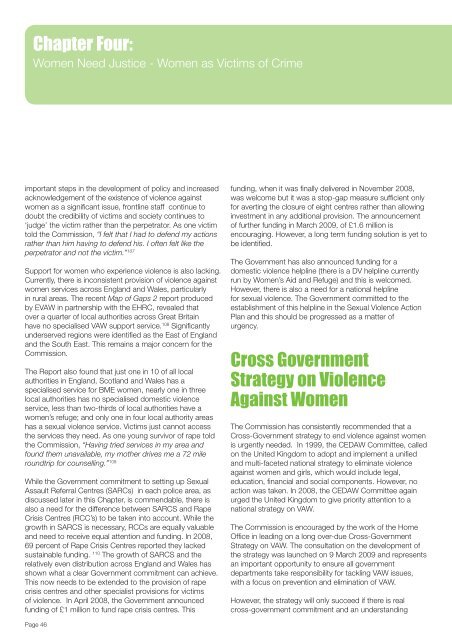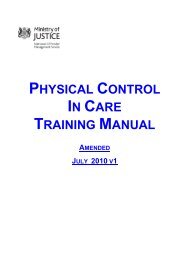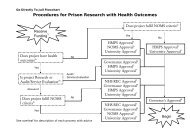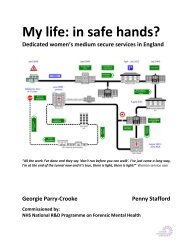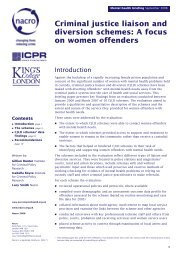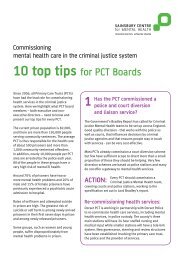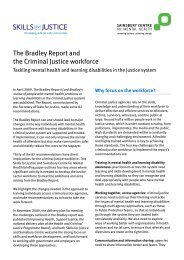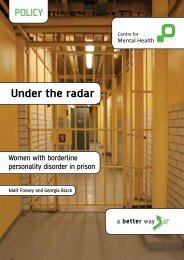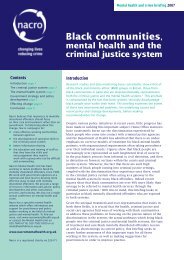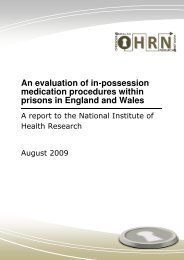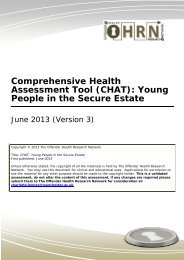Engendering Justice - from Policy to Practice - The Fawcett Society
Engendering Justice - from Policy to Practice - The Fawcett Society
Engendering Justice - from Policy to Practice - The Fawcett Society
- No tags were found...
Create successful ePaper yourself
Turn your PDF publications into a flip-book with our unique Google optimized e-Paper software.
Chapter Four:Women Need <strong>Justice</strong> - Women as Victims of Crimeimportant steps in the development of policy and increasedacknowledgement of the existence of violence againstwomen as a significant issue, frontline staff continue <strong>to</strong>doubt the credibility of victims and society continues <strong>to</strong>‘judge’ the victim rather than the perpetra<strong>to</strong>r. As one victim<strong>to</strong>ld the Commission, “I felt that I had <strong>to</strong> defend my actionsrather than him having <strong>to</strong> defend his. I often felt like theperpetra<strong>to</strong>r and not the victim.” 107Support for women who experience violence is also lacking.Currently, there is inconsistent provision of violence againstwomen services across England and Wales, particularlyin rural areas. <strong>The</strong> recent Map of Gaps 2 report producedby EVAW in partnership with the EHRC, revealed tha<strong>to</strong>ver a quarter of local authorities across Great Britainhave no specialised VAW support service. 108 Significantlyunderserved regions were identified as the East of Englandand the South East. This remains a major concern for theCommission.<strong>The</strong> Report also found that just one in 10 of all localauthorities in England, Scotland and Wales has aspecialised service for BME women, nearly one in threelocal authorities has no specialised domestic violenceservice, less than two-thirds of local authorities have awomen’s refuge; and only one in four local authority areashas a sexual violence service. Victims just cannot accessthe services they need. As one young survivor of rape <strong>to</strong>ldthe Commission, “Having tried services in my area andfound them unavailable, my mother drives me a 72 mileroundtrip for counselling.” 109While the Government commitment <strong>to</strong> setting up SexualAssault Referral Centres (SARCs) in each police area, asdiscussed later in this Chapter, is commendable, there isalso a need for the difference between SARCS and RapeCrisis Centres (RCC’s) <strong>to</strong> be taken in<strong>to</strong> account. While thegrowth in SARCS is necessary, RCCs are equally valuableand need <strong>to</strong> receive equal attention and funding. In 2008,69 percent of Rape Crisis Centres reported they lackedsustainable funding. 110 <strong>The</strong> growth of SARCS and therelatively even distribution across England and Wales hasshown what a clear Government commitment can achieve.This now needs <strong>to</strong> be extended <strong>to</strong> the provision of rapecrisis centres and other specialist provisions for victimsof violence. In April 2008, the Government announcedfunding of £1 million <strong>to</strong> fund rape crisis centres. Thisfunding, when it was finally delivered in November 2008,was welcome but it was a s<strong>to</strong>p-gap measure sufficient onlyfor averting the closure of eight centres rather than allowinginvestment in any additional provision. <strong>The</strong> announcemen<strong>to</strong>f further funding in March 2009, of £1.6 million isencouraging. However, a long term funding solution is yet <strong>to</strong>be identified.<strong>The</strong> Government has also announced funding for adomestic violence helpline (there is a DV helpline currentlyrun by Women’s Aid and Refuge) and this is welcomed.However, there is also a need for a national helplinefor sexual violence. <strong>The</strong> Government committed <strong>to</strong> theestablishment of this helpline in the Sexual Violence ActionPlan and this should be progressed as a matter ofurgency.Cross GovernmentStrategy on ViolenceAgainst Women<strong>The</strong> Commission has consistently recommended that aCross-Government strategy <strong>to</strong> end violence against womenis urgently needed. In 1999, the CEDAW Committee, calledon the United Kingdom <strong>to</strong> adopt and implement a unifiedand multi-faceted national strategy <strong>to</strong> eliminate violenceagainst women and girls, which would include legal,education, financial and social components. However, noaction was taken. In 2008, the CEDAW Committee againurged the United Kingdom <strong>to</strong> give priority attention <strong>to</strong> anational strategy on VAW.<strong>The</strong> Commission is encouraged by the work of the HomeOffice in leading on a long over-due Cross-GovernmentStrategy on VAW. <strong>The</strong> consultation on the development ofthe strategy was launched on 9 March 2009 and representsan important opportunity <strong>to</strong> ensure all governmentdepartments take responsibility for tackling VAW issues,with a focus on prevention and elimination of VAW.However, the strategy will only succeed if there is realcross-government commitment and an understandingPage 46


